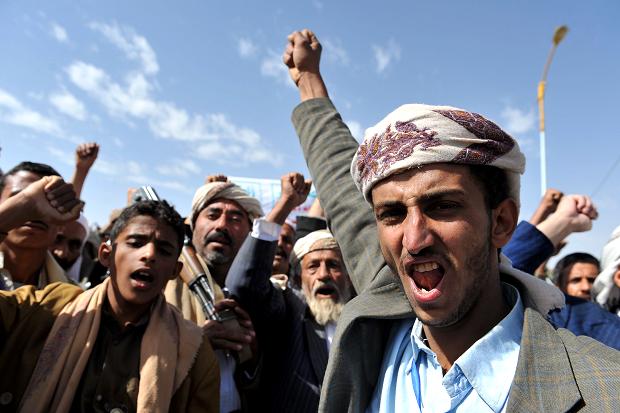(Men gathered to protest drone strikes in Yemen in January: Times of London)
There is one change that the United States could make in response to the terrorism threat that is never discussed. That is to consider the part U.S. policies have played in creating and sustaining it.
I understand that we are not supposed to say this, as if discussing why we are hated justifies the unjustifiable: the targeting of innocent Americans because of the perceived sins of their government.
But nothing justifies terrorism. Period. That does not mean that nothing causes it.
| Nothing justifies terrorism. Period. But that does not mean that nothing causes it. |
Acts of terror do not come at us out of the blue. Nor are they directed at us, as President George W. Bush famously said, because the terrorists “hate our freedom.” If that was the case, terrorists would be equally or more inclined to hit countries at least as free as the U.S., those in northern Europe, for instance.
No, terrorists (in the case of the Boston Marathon bombings Muslim terrorists) target the U.S. because they perceive us as their enemy.
And with good reason.
We have been at war with the people of various Muslim countries for decades, since perhaps as early as 1953 when we engineered Prime Minister Mohammed Mossadegh’s overthrow in Iran after he nationalized the oil industry.
Since then, the U.S. invaded Iraq in 2003, on a pretext that was shown to be phony, at a cost of hundreds of thousands of Iraqi lives. That war came after over a decade of U.S.-sponsored sanctions that resulted in the deaths of over a million Iraqis, including more than a half million children due to malnutrition and diseases caused by the lack of clean water and medicine.
Then there are the current sanctions against Iran, ostensibly to deter its government from developing nuclear weapons but, in practice, punishing the Iranian people by degrading their quality of life as well as their health. (Just one example: the Iranian civilian airline has experienced a major spike in air crash deaths since sanctions have prevented it from purchasing parts needed to replace worn and outmoded machinery.)
Then there are the drone attacks. U.S. Sen. Lindsey Graham (R-S.C.), a member of the Senate Armed Services Committee, said in February that, as of then, U.S. drone attacks had killed 4,700 men, women and children (including, he notes, “innocent people”) in Afghanistan, Yemen and Pakistan.
And, of course, our Israel policy is based on the premise, so often stated by Vice President Joe Biden, that there must be “no daylight, no daylight” between Israeli policies and our own.
That statement has proven true on matters large and small – from Congressional promises to join Israel if it decides to attack Iran to destroy its nuclear reactor, to supporting Israel’s policies on the West Bank and Gaza, to opposing any form of Palestinian representation at the United Nations. Muslims do not imagine that we view the Middle East almost entirely through Israeli eyes. We do.
In short, the aphorism often used to describe the effect of drone attacks can be applied to U.S. policy in the Muslim world in general: for every enemy we kill, we create dozens or hundreds more.
And some of those enemies turn up here as terrorists.
So my question is this: why can’t the likelihood of blowback be part of the calculation when policymakers decide to take a particular action or make a particular statement relating to the Middle East or the Muslim world in general?
Obviously the U.S. is not going to consider this factor as it decides on policies unambiguously affecting the fundamental security of the American people. No one would argue that we should not take out a terrorist cell poised to attack American targets out of fear of inflaming its members’ friends or sympathizers.
But few of the actions that so enrage (and radicalize) people in the Middle East are directly connected to the security of Americans at all: not the excessive number of drone attacks or Iran sanctions or our backing of the post-1967 Israeli occupation. Looking back at the Iraq and Afghanistan wars, it is difficult to argue that they did more to enhance the security of Americans than they did to damage it.
This is not to say that the U.S. should not have responded with force to the heinous 9/11 attacks. The successful effort to degrade the capabilities of Al Qaeda has, no doubt, made us safer.
And some of our enemies hate us not because of anything we do but because they are driven by religious or political zealotry. Some are just monsters. But not all, and not most.
| Looking back at the Iraq and Afghanistan wars, it is difficult to argue that they did more to enhance the security of Americans than they did to damage it. |
And not every threat is Al Qaeda. In fact, not every group we deem as terrorist is an enemy of the U.S. at all. Some are engaged in local wars or insurgencies that have nothing to do with us, at least not before we jump in to assume the role 1960s folk singer Phil Ochs referred to as “cops of the world.”
Because if this is what we are going to be, we are going to feel it here, not only in the form of terrorism but in the form of the loss of our own freedoms. At the rate we are going, the restrictions we have become accustomed to when trying to board an airplane will become a metaphor for the loss of the freedom we once thought of as encapsulating the American way of life.
The next threat to that freedom looms as the Obama administration considers whether it will permit (or even back) an Israeli attack on Iran. During his trip to Israel this week, Secretary of Defense Chuck Hagel told the Israelis that the U.S. believes that “in dealing with Iran, every option must be on the table.”
That “every option” formulation, of course, refers to the possibility of war.
Can anyone doubt that an Israeli attack on Iran backed by the U.S. would have terrible repercussions here at home and that they would continue for a long, long time? Is that what we want? Is that something we can even tolerate?
With the Boston Marathon horror still fresh in our memory, I think it is safe to say that we cannot. Nor should we. But it’s our decision. Pursuing policies that enrage much of the world endangers Americans here. In Boston, New York, Washington and, ultimately, elsewhere as well.
Is it too much to ask that policymakers keep that in mind when making their calculations about where next to show the flag?
Their primary responsibility is to protect Americans. It is time for them to stop endangering them.
M.J. Rosenberg is a Special Correspondent for The Washington Spectator. He was most recently a Foreign Policy fellow at Media Matters For America. Previously, he spent 15 years as a Senate and House aide. Early in his career he was editor of AIPAC’s newsletter Near East Report. From 1998-2009, he was director of policy at Israel Policy Forum. Follow him @MJayRosenberg and @WashSpec.
Editor’s Note: Farea al-Muslimi, a Yemeni writer educated in the U.S., testified before the Senate Judiciary Committee on Tuesday. He described a drone strike on his village in Yemen six days prior.
“The drone strikes are the face of America to many Yemenis,” he said. “If America is providing economic, social and humanitarian assistance to Yemen, the vast majority of the Yemeni people know nothing about it. Everyone in Yemen, however, knows about America and its drones.”
Al-Muslimi added that drones and the U.S. policy of “targeted killing” allow the Yemen-based al Qaeda affiliate to “convince more individuals that America is at war with Yemen.”





0 Comments